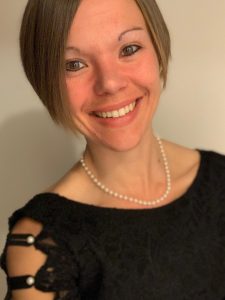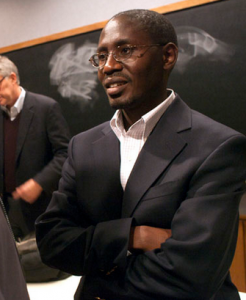News
Woman Hid OU Professor Sexual Harassment Out Of Fear For Job, Career Prospects
By: Susan Tebben
Posted on:
ATHENS (WOUB) – Lindsay Boyle was an undergraduate student at Ohio University in 2011, with aspirations to become an international journalist. What she didn’t have was the financial support to live on an unpaid internship.

Photo provided by Lindsay Boyle.
It was for those reasons that a program in Zambia with a professor who had news experience and contacts abroad seemed like the perfect fit for the burgeoning reporter from Northeast Ohio.
And it was the fear of losing her wages at the job the Journalism professor offered her while in Zambia, and the opportunities that came with the job, that led her to initially deny that he sexually harassed her.
“..If I corroborated (the accusation of sexual harassment), they might take it seriously, but in the meantime I would be out of the job…and he might get to keep his,” Boyle said.
Another student on the trip reported Dr. Yusuf Kalyango’s actions in an evaluation form, and documents from an Ohio University investigation show a member of the Office of Equity and Civil Rights compliance reached out to Boyle by email, asking her to sit down with them.
In an interview with WOUB News, Boyle said she thought a lot about whether or not she wanted to admit to what had happened at the time. She debated telling OU officials her story about when he kissed, slow danced, and made her feel uncomfortable while in Zambia.
But she also thought about her desire to keep moving on her career path, and her desire to continue her education.
“If I didn’t get that job, I wouldn’t have met the people that I ended up going on a grant to Ghana with for three months,” Boyle said, adding that she was hired for a job after graduation specifically because of her study abroad experience.
#MeToo
Boyle said a part of the reason she didn’t want to speak up then but later decided to be a part of a university investigation was the #MeToo movement. In 2011, the larger cultural reckoning over sexual harassment by men in positions of power that sparked the #MeToo movement didn’t exist, so at the time Boyle feared her story could be brushed under the rug.
“There wasn’t really any example of a single student, victim, survivor…coming forward, and a professor facing the consequences,” Boyle said. “Especially not a professor who’s bringing in all kinds of money to the university by way of this (International Institute for Journalism).”
Kalyango is still listed on OU’s School of Journalism website as the head of the Institute for International Journalism.
Seven years later, though, she felt the need to change the narrative that comes with women reporting sexual harassment.
“I wanted to speak out because I think the more people who speak out, the less likely the first reaction is going to be ‘wow, I can’t believe this happened,'” Boyle said. “The first reaction should be ‘man, this is happening way too much.”
But in order to conduct the new investigation, Boyle had to recall her memories, and more than that, find evidence to prove her claims. These included not only events from the Zambia trip, but also a Washington D.C. trip, and another that was planned for Santiago, Chile, but was cancelled.
“I had to do a full blown investigation into myself to find some of this stuff, including my own check-ins that placed me in the hotel where he was in D.C.,” Boyle said.
Kalyango Denials
For Kalyango’s part, he denies every part of Boyle’s accusation, along with the accusations of another woman, Tess Herman, who was also found to have been sexually harassed by Kalyango in an OU investigation.

In responses to the investigation provided to WOUB News by Kalyango, he questions the legitimacy of Boyle’s memory from seven years ago, and argues there isn’t enough evidence presented to prove she went on the trip to D.C., or was even invited to Santiago, despite emails that show her discussing the trip with another person.
A travel itinerary provided to ECRC lists Boyle’s name and flight numbers for flights to and from Santiago, Chile, on June 25 and 26 and July 1 and 2, 2012. Screenshots given to investigators show an online check-in by Boyle to the Renaissance Hotel in D.C., where Kalyango admits he went during a trip for an administrative meeting, according to the investigation’s memorandum of understanding.
In regard to the Zambia trip, Kalyango denies all accusations, and writes in his response documents that rules in place would have prevented any of the alleged actions from taking place.
“There is no way such an incident would have occurred because of the rules and daily schedule/routine that (he and the other leaders of the trip) implemented and strictly adhered to during the program,” he wrote.
Kalyango also questioned the woman’s motives for saying she lied when asked if any sexual harassment occurred on the Zambia trip.
“If her arguments that she ‘lied’ to ECRC in 2012 are to be believed, then why then did she not come out in 2014 or 2015? Why suddenly in March 2018?” Kalyango wrote in the response documents. “Perhaps, there could be an orchestrated agenda behind all of this that you may look into. But I don’t know what that could be.”
In the findings of the OU investigation, Kalyango said he would not have “embraced, kissed or attempted to make out with” Boyle because “he knew at the time of the trip to Zambia that (she) was gay, because she had ‘alluded to being gay'” after she had agreed to be his assistant.
Boyle, however, says she didn’t know she was gay herself until she met her now-wife, the year after her Zambia trip.
“When Yusuf decided to use my sexual orientation as a reason he would not have put his tongue in my mouth, I was flabbergasted,” Boyle said.
No Regret
After waiting more than a year for the results of the investigation, and seeing her claims substantiated officially, Boyle said she wouldn’t change the way in which she decided to report her sexual harassment, including the process of deciding to hide it initially.
“I’m 99 percent sure that I would do that again,” Boyle said. “Really, only I would have been punished, most likely, if I had come forward at that time. I wouldn’t have got a job, and probably Yusuf wouldn’t have been punished.”
Boyle’s case will be included in documents being given to a faculty committee, who will decide whether or not to recommend to university administration stripping Kalyango of his tenure. Those documents will also include the results of Herman’s case, along with a retaliation case filed against Kalyango by a third student, the claims for which were deemed unsubstantiated. Detenuring procedures are laid out in the Faculty Handbook.

